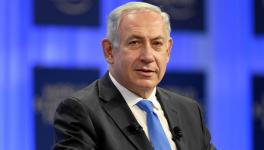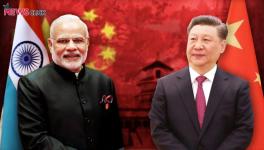Great Symbolic Value of P5+1 Accord
Newsclick speaks to Aijaz Ahmad, senior political analyst on the developments post the Iran-US Accord on nuclear issues, popularly known as the P5+1 Accord. Ahmad says the Accord, politically, is a very important event and it has a much greater symbolic value than the substantive value. With this, Iran has taken the existential threat card out of Israel's hands. There is now no more talk about invasion and bombing of Iran. With just two more years left for the Obama Presidency, this Accord signifies that it is now concentrating more on its domestic policy.

Prabir Purkayastha (PP): Aijaz, we discussed before that this was something which was going to happen. And it was already building up to a, some kind of an accord. This is an accord United States could have got long back. So, there's nothing in that sense, new..
Aijaz Ahmad (AA): 2003. Qatami offered exactly, basically the same…
PP: In fact, lower degree of enrichment than what they have allowed for now. So, essentially it's a change of US policies towards the region? What explains this?
AA: Well, the setbacks that the United States has suffered in the area; partly, thanks to Iran. They went in there into Iraq and then he did Iran too, help them get a Shia dispensation there and the winner of the war was Iran. They wanted to have a government in Afghanistan and they could not get the Jirga to agree to Karzai and the Iranis arranged it for them. They need Iran again now, both in Afghanistan and in Syria. So, that’s part of what it is. That the whole 10 year of policies that were formulated by the no-conservatives around the Bush administration are finally seen to have not worked. And in that sense, we can say that it is the Iranis who have stared them down. And they finally have had to recognize that you cannot invade Iran; war in my view was always an empty threat and Iranis knew it. The real issue was sanctions – how far? They were at a point I believe where they had to either escalate the sanctions to a point where number of countries, and I believe including India, certainly China and Russia were going to openly break them. They could not get an agreement from major consumers of oil, for any further escalation. And countries including India were already very unhappy about all the arrangement that they had to make over payments, withhold payments etc.
PP: Essentially the sanctions regime and this is really the US sanctions regime, it’s not the United Nations sanctions at all; these are unilateral sanctions, they are illegal sanctions; they are imposed against what are the WTO agreement. So therefore, these are all illegal sanctions. And those illegal sanctions were coming to a head in the sense that any further escalation would lead to the breaking of sanctions. People breaking, countries breaking the sanctions..
AA: Absolutely. And you see Iran not only did not give in on the nuclear issue, they defined for themselves what the limits of their own actions are and they stayed within those self-defined limits; but most importantly in Syria, the situation was that if Americans and Saudis and all these people were going to give weapons to their side, Iran was going to give weapons to Syria. So, sanctions even did not work even to that extent of restraining what the Irani policy is. It is not exporting revolution as these Sunni takfiri types are exporting revolution, Saudis and so on. But for a long time they have a settled policy that they will draw the line, Hezbollah and Syria, and they drew that line. So it was holding on to that position and the Americans had a choice. You know, at this point how do you escalate, against, just as they had to step back on the question of Syria, because they simply do not have a consensus or agreement even among their own allies.
PP: Essentially, further escalation was out and if further escalation is out and as you said they needed the help of Iran to get out of Iraq and Afghanistan at least with some of its, shall we say, army, soldiers and other things intact, if that was to happen they needed Iran’s help. So, this was the situation that was there on the ground. The other part of it, and that’s an important issue, is that both sides have conceded very little except what is the end state and the end state becomes very important because if you see only 7 billion dollars of sanctions have been removed and out of 100 billion dollars frozen of the Iranians in various banks around the world, which people are not able to pay back, like India’s oil imports and so on…So, if you look at that Iran has got not so much out of it and the Americans also have got really less than what they would have got 5 years, 6 years, 7 years, 3 years before. So, both sides have not conceded much. But the end state is that Iran has now accepted, though the Americans have been publicly denying it, that they have the right to fuel enrichment…
AA: If the agreement says that they can keep their 3.5 limit, you know, it’s written into the agreement. But that actually is a minor point. I mean that is there. Iran has not conceded the basics. Iran has conceded a lot, if you start with the presumption that Iran was heading towards a nuclear weapon. Therefore, all this talk that Iran has to do this, has to do this, has conceded this and that – presumes that it was heading towards weaponisation. It was not.
PP: It is America claiming victory in a war which Iran never fought.
AA: Yeah. And, sensible people can see through it. Iran has taken the existential threat card out of Israel’s hands. Israel can no longer go around saying we are going to invade because there is an existential threat and they are building a bomb. America recognizes that there are not building the bomb and you can have an agreement with them. They have done that. All the talk of – we are going to bomb Iran, we are going to invade Iran, real mango to Teheran, all that – there’s an end to it. So, you see, the symbolic value of this is even greater than the substantive value, of you know, how much this and how much that. Now, yes, we will see what happens over the next 6 months. I also believe that, we don’t know, but, you know, Obama has only 2 years left of his presidency. He is very much beleaguered at home in domestic policy. He has to concentrate on that domestic policy and not allow others to drag him into these unnecessary wars – Syria and Iran, and this, that and others. So, de-escalating all that. Moreover, I would say that first on Syria and now especially on Iran, this is the first time that the US government, pursuing its own interests, has defied Israel and OPEC. The slap in the face of Israel that they carried on direct in-depth negotiations with Iran, without even as much as informing the Israelis - so, in all these ways, politically it is a much more important event than, you know, what levels of enrichment, this, that and so on… that 6 billion, yes absolutely there are scores of billions are still frozen all over the place. But you begin this process. New deals on oil sales are now in the works. The currency is, you know, jumping and so on. So the effects are very good.
PP: Effects, really in countries like India as well, because we were having problems getting Iranian oil, also getting insurance for tankers which would carry oil. It was really...sanctions were not really just on the fact that you could or couldn’t buy oil. It was also on this kind of things. But, getting out of that, you know, you made a very important point that this is the first time that US has a policy which is not in alignment with what Israel wants. And, this is the first time there seems to be a clear breach between what the United States wanted and what Israel wanted the United States to do. Similarly it seems the Saudi reaction to this has also been fairly negative though not as public and Saudis also seem to be gearing up for a different, you know, saying publicly that they have a different position than the United States, they will follow their own independent policy. But it’s interesting that Gulf monarchies, apart from Saudis, seem to be all talking to Iran…
AA: Those monarchies, first Turkey, and then these monarchies actually forced the Saudis not to take a much stronger public position because, rumor has it that the Saudis wanted the Kuwaiti Prime Minister to lead a delegation to Washington against it and he refused and UAE refused and so on and so they found themselves very isolated in their own region. Let me also add that, you see, the alliance between China, Russia and Iran is, in my view, strategic. Oil is a very big factor. If sanctions go, Iran can be a very big market for Russia and China to come in for re-development of Iran and so on and so forth. But, the ramification of the point I was speaking earlier, that Iran is not exporting Islamism. Saudis are. Qataris are. So, the threat of Islamism that both China and Russia faced; China on its own territory and Russia on its most important sphere of influence, comes from them.
PP: Also, within Russia, those small…
AA: Within Russia, of course,
PP: Caucasus region, of course
AA: It comes from there. Chechnya
PP: Exactly.
AA: Sure. So that is a long term strategic interests of that kind as well.
PP: Against Takfiri Islam.
AA: Absolutely. Takfiri and what amounts to Sunni. You know this thing about Sunni/Shia. The one thing about the Iranis is that they have not played that game. They have not played that game inside the region. They were supporting Hamas. Hamas broke with them. They were not doing Shia/Sunni. And they were not exporting. These people are. So, they are now being seen as pariahs, specially after what they have done in Syria. So, they are actually being seen by the Russians and the Chinese. They may not say much about it but it's quite obvious that they would be feeling very threatened by these..
PP:And considering what Saudis have been talking about regarding Chechen and their ability to control Chechens, even in the discussion with Putin during winter Olympics.
AA:Absolutely; they had the temerity to threaten them with terrorism inside Russia of that scale.
PP: And, this is Saudi Arabia against Russia and they have some delusions of grandeur just because they have petro dollars.
AA: They are mad. They can't even control their own friends in the GCC.
PP: So, this has in some sense come up for Saudi Arabia?
AA: In a very important sense, yes. I would say so. How far it will go, I do not know. I think there is a desperate kind of alliance between Saudi Arabia and Israel. I would also suggest to you that I think that it is Netanyahu's extremism, both of policy and of rhetoric, and his actually threatening Obama directly, funding the opposition literally; Romney was his candidate and saying all kinds of things and you know make you pay etc, etc. That extremism has, I believe, also played into the situation where, for the first time, a very large part of the US administration began to say, well our national interests are really different.
PP: That bring us to a very important question. There has always been this debate – is Israel lobby in the United States really controlling US policies or is it that the interests of the US foreign policy and Israel coincided and that is why this amount of influence which appeared to be completely out of proportion. Do you think finally it is clear that Israel was useful to the United States and that is why the alignment or do you think that there really was a disproportionate OPEC influence, Zionist influence on the US foreign policy which went against US own interests?
AA: Well, they have always had a far greater influence in the Congress than in the White House. They have had a far greater influence on the electoral machineries of the two political parties through funding and things of that kind. That is real. That is very real. And they have similar things in France and, through out. That is real. So, either/or, I believe is really wrong. Yes, I have always believed that the only truly reliable friend, long term historically reliable friend that they have in the region is Israel. Saudi Arabia is one coup away. You know, any of these regimes can go and some other kind of regime can come. Never in Israel. So in that sense the relationship is absolutely symbiotic in that. Therefore the US does what it does. But at the end of the day, what is I think beginning to happen is that there is now a very large US elite, possibly in the defense establishment, certainly in the academies, certainly in the mass media, certainly in the universities, this, that and the other – opinion makers – who are beginning to have the courage to say that these are different national interests.
PP: And the extreme Zionism which has taken charge or control of Israel which is being termed as settler Zionism, which is really run from the occupied territories of the Palestinians, from the colonies. So that is also something which is not in the long-term interests of Israel-United States.
AA: Yes. I don't like the term, because all Zionism is settler Zionism.
PP: That's why I said settler Zionism in the West Bank. Specifically saying it.
AA: You know Israeli politics has shifted enormously over the last 15-20 years. Within a generation. What used to be a substantial minority fringe, is now 70 per cent or so, majority, you know, overwhelming majority inside Israel. That politics has shifted a lot, and that also, the more level headed people in the US establishment are seeing that this is not something that is going to serve our interests. The particular kind of labour-liberalism is what corresponds to our interests; not this business. So there is that rift. And in my sense is that this so-called public opinion sphere in the United States is a major battleground, I think for people to engage in, because if that shifts then the US administration would be much freer to pursue their own national interests even when they are in disagreement with Israel.
PP: Essentially US pursued its national interests with some intelligence, that would be better than really tailing behind Netanyahu kind of extreme Zionism which is exhibited in the region, which is actually unsettling the whole region.
AA: And I think some of this new sense that they seemed to have acquired on the issue of Syria and Iran, more recently is actually a partly an the index of the growing crisis that some people are beginning to understand that your claims of omnipotence are vastly exaggerated; you better pull in the threats. So its recognition of also weakness.
PP: Thank you very much Aijaz. We will come back and see how these negotiations unfold because there are still six months of these hard negotiations to go and we need to see how the realignments takes place in the region, which, today, seems to be in the offing and acceptance of Iran as a regional player, at least. That seems to be something that the United States has now conceded. Thank you very much.
AA: Sure. Thanks.
Get the latest reports & analysis with people's perspective on Protests, movements & deep analytical videos, discussions of the current affairs in your Telegram app. Subscribe to NewsClick's Telegram channel & get Real-Time updates on stories, as they get published on our website.






















